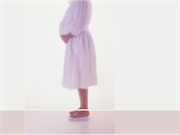- Could Your Grocery Store Meat Be Causing Recurring UTIs?
- Are You Making This Expensive Thermostat Error This Winter?
- Recognizing the Signs of Hypothyroidism
- 10 Strategies to Overcome Insomnia
- Could Artificial Sweeteners Be Aging the Brain Faster?
- Techniques for Soothing Your Nervous System
- Does the Water in Your House Smell Funny? Here’s Why
- Can a Daily Dose of Apple Cider Vinegar Actually Aid Weight Loss?
- 6 Health Beverages That Can Actually Spike Your Blood Sugar
- Treatment Options for Social Anxiety Disorder
Placenta May Help Shield Fetus From COVID-19

Some key molecules used by the new coronavirus to cause infection aren’t found in the placenta, which may explain why the virus is rarely detected in fetuses or newborns of women with COVID-19.
U.S. government researchers found that placental membranes lack the messenger RNA (mRNA) molecule required to make the ACE2 receptor. SARS-CoV-2 — the virus that causes COVID-19 — uses that cell surface receptor to cause infection.
These placental tissues also lack mRNA needed to make an enzyme that SARS-CoV-2 uses to invade a cell, the U.S. National Institutes of Health (NIH) researchers found.
However, the placenta does have molecules that previous research has suggested may be potential routes for SARS-CoV-2 infection, the findings showed. Those molecules include the CD147 receptor and the enzymes cathepsin L and Furin.
The researchers also found that placental and membrane tissue have a type of immune cell (macrophage) with the critical cell surface receptor. But there’s little evidence the new coronavirus could spread to the placenta, membranes and fetus in a normal pregnancy, they said in an NIH news release.
The investigators also found that the placenta contains many receptors used for infection by Zika virus and cytomegalovirus. Both pose serious health risks when passed from a pregnant woman to her fetus.
The findings were published online July 14 in the journal eLife. The study was conducted by a team led by Dr. Roberto Romero, chief of perinatology research at the U.S. National Institute of Child Health and Human Development, in Detroit.
More information
The U.S. Centers for Disease Control and Prevention offers COVID-19 advice for women who are pregnant or breastfeeding.
Source: HealthDay
Copyright © 2026 HealthDay. All rights reserved.










